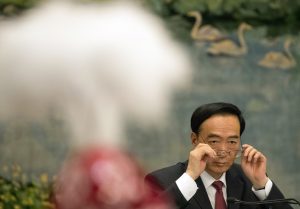On December 25, 2021, Chen Quanguo was replaced as the Chinese Communist Party Secretary of Xinjiang Uyghur Autonomous Region. For some observers, this might be seen as a Christmas present from the Chinese government, indicating a possible shift away from the hardline policies in the region. Uyghurs are not so naive. We know that Chen’s replacement, Ma Xingrui, a party technocrat who was the governor of Guangdong before his new appointment, will not bring any relief for peoples targeted for genocide.
What was most confusing in the reactions to the leadership change was the absence of calls for Chen to face accountability. To me, and many other Uyghurs, Chen Quanguo’s name is synonymous with genocide. Speculation about the end of Chen’s rule of terror is beside the point. What matters is the pursuit of justice for Uyghurs and other Turkic peoples who have been disappeared, interned, jailed, sterilized, tortured, and murdered.
The accountability of Chinese officials responsible for a 21st century genocide is critical for the future of the Uyghur people. Our resilience will carry us through these dark days. For now, Uyghurs will find ways, whether in precarious exile or in the solitude of their minds for those imprisoned in China, to reconstruct our lives and identity. Yet, as a condition of collective trauma management, we must also have justice against those who are destroying our “Uyghurness.”
2021 saw some steps toward the goal of accountability, but the world can and must do more. This genocide is far from finished. On December 9, the independent Uyghur Tribunal, overseen by a panel of international experts, judged that China “has committed genocide, crimes against humanity and torture” against Uyghurs and other Turkic peoples. On December 23, U.S. President Joe Biden signed the Uyghur Forced Labor Prevention Act into law, which ends the entry of goods into the U.S. market made with the forced labor of Uyghurs. In addition, a growing number of countries are joining a diplomatic boycott of the Beijing Winter Olympics in February 2022.
It has taken five years of hard work to get to this point of awareness. Finally, the world, in parts, is waking up to the scale of the problem. Since 2016, the Chinese government has been undeterred in carrying out atrocities in East Turkistan. In addition to mass arbitrary detention and imprisonment, China is engaging in a systematic campaign to eradicate Uyghur culture, religion, and language through policy and practice. Other abuses include widespread forced labor, systematic removal of children from their families, and a coercive birth prevention campaign.
As leaked Chinese state documents have revealed, China’s senior leadership, including Xi Jinping, green-lit one of the globe’s most urgent human rights crises. The policy called for a “round up” of “all who should be rounded up” and instructed officials to show “absolutely no mercy” toward “enemies.” Those enemies, we discovered, included any Uyghur. It was a criminalization of ethnicity.
Unless a state, a multilateral organization, or a private company operating in China is actively seeking accountability or answers to questions from Chinese officials about genocide in East Turkistan, it risks becoming complicit. Some state leaders, such as Pakistan’s Imran Khan, as well as organizations like the the International Olympic Committee and the Organization of Islamic Cooperation, and companies like Volkswagen have already demonstrated what it is like to be on the wrong side of history by protecting China. These people and entities will carry tainted legacies as they count Chinese state investment money and profit from human suffering.
In 2022, the world needs to step up on accountability measures, especially Muslim majority states. Legislation on forced labor, protection from China’s transnational repression, Magnitsky sanctions against individuals responsible for the rights abuses, meaningful pressure in the United Nations, and recognition of China’s actions as genocide are just some of the actions to take. Members of civil society should be asking our representatives to do more. We all have a personal stake, as China is putting in place a blueprint for how to get away with genocide. We are all vulnerable when ambitious authoritarians don’t fear consequences for their atrocities.
Chen Quanguo may have packed his bags and headed for the exit from East Turkistan. But he must not escape being held to account for his crimes. The same goes for China’s senior leadership. A resolute focus on consequences for those responsible is key to dismantling the apparatus of genocide.

































